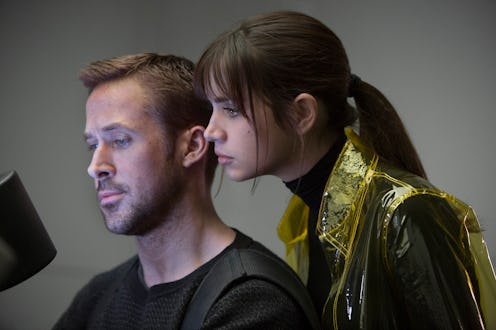Entertainment
What To Make Of That Huge Ryan Gosling Reveal In 'Blade Runner 2049'

Part of the reason Blade Runner has become such an iconic piece of cinema and a cult classic is because it sparked 30 years worth of debate by asking one simple question: is Rick Deckard (Harrison Ford) really a replicant? Blade Runner 2049 is attempting to spark a similar debate by asking the opposite question. Major spoilers ahead! Is new protagonist K (Ryan Gosling) really a human? The mystery of Ryan Gosling's parents in Blade Runner 2049 is key to this question, and the catalyst for K's entire journey in the film.
Early on in Blade Runner 2049, it is established that K is a replicant. There is no question about it — he's not human, nor does he believe he is (at least at this point in the movie). Despite his non-human status, or perhaps because of it, he is a Blade Runner, following in Deckard's footsteps, and generally goes about his business as a replicant tasked with killing other replicants. But there's something that keeps nagging at him: a memory of his childhood, which makes him believe that he might actually have been human, and born to real parents. But that's not the case. K's arents in Blade Runner 2049 don't exist, as as a replicant, he was made by machinery, not pregnancy. And yet, he has a memory of childhood that is so strong, it leads him to suspect that he isn't all replicant, but maybe half human.
K's suspicions about his parentage lead him to search for Deckard, the man he suspects could be his father. After he learns that Deckard and Rachael had a child and kept the child secret, he starts to hope that he might be that child. Unfortunately, Deckard and others dash his dreams. It turns out that the memory that inspired K to look for Deckard in the first place was implanted into his consciousness, and actually belongs to the real child, a daughter.
The question of K's parents in Blade Runner 2049 works on two very important levels. From a practical angle, it allows for the seamless return of Ford to the franchise, something director Denis Villeneuve struggled with early in development. "One of the toughest things for me, with this project, was to bring back Rick Deckard, Harrison's character," he told Collider. "At the beginning, there was a long period of silence and uncertainty, in regard to how to be bringing this character back to life." Working with Ford and co-screenwriter Hampton Fancher, the director worked out the perfect way to re-introduce the character with K's identity crisis.
K's suspicions about his part human heritage also gets to the thematic core of the Blade Runner franchise. What does it mean to be human? Would having human DNA really make K's consciousness any more or less human? "This is about what it means to be human," Ford told ABC News. "What are our opportunities, what are our responsibilities, do they really exist?" Just because K is a replicant and doesn't have parents doesn't necessarily make his mind, emotions, and life any less human. Or, maybe it does, depending on the viewer.
Granted, nothing in Blade Runner 2049 is explicit. The plot to 2049 is pretty complex, and a majority of the questions it poses are left unanswered, or answered so vaguely that they leave room for interpretation. It's possible that K could be part human, or that Deckard is a replicant and there is no half human child. And that's the point. "I think it's interesting, too, to see a character that is doubting about his own identity," Villeneuve said in an interview with IGN. "And I think the question is more interesting. There's more — I love mysteries. So I think that it's more interesting than ... answering that question."